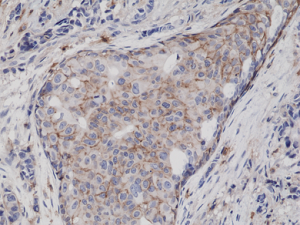anti-CD44 (human) Rabbit Monoclonal (RM264)
| Code | Size | Price |
|---|
| REV-31-1146-00-R100 | 100 ul | £455.00 |
Quantity:
Prices exclude any Taxes / VAT
Overview
Antibody Isotype: Rabbit IgG
Antibody Clonality: Recombinant Antibody
Antibody Clone: RM264
Regulatory Status: RUO
Target Species: Human
Applications:
- Immunohistochemistry (IHC)
- Western Blot (WB)
Shipping:
Blue Ice
Storage:
+4°C
Images
Documents
Further Information
Alternate Names/Synonyms:
Epican; Extracellular Matrix Receptor III; ECMR-III; GP90 Lymphocyte Homing/Adhesion Receptor; HUTCH-I; Heparan Sulfate Proteoglycan; Hermes Antigen; Hyaluronate Receptor; Phagocytic Glycoprotein 1; PGP-1; Phagocytic Glycoprotein I; PGP-I
Concentration:
N/A
EClass:
32160000
Form (Short):
liquid
Formulation:
Liquid. 50% Glycerol/PBS with 1% BSA and 0.09% sodium azide.
Handling Advice:
Avoid freeze/thaw cycles.
Immunogen:
A peptide corresponding to the extracellular domain of human CD44.
Long Description:
Recombinant Antibody. This antibody reacts to the extracellular domain of human CD44. Applications: WB, IHC. Source: Rabbit. Liquid. 50% Glycerol/PBS with 1% BSA and 0.09% sodium azide. CD44 cell surface antigen is a 100 kDa type 1 transmembrane glycoprotein widely expressed on human leucocytes, white matter of the brain and by some epithelial cells of the intestine and breast. Several isoforms of CD44 exist. CD44 is a receptor for hyaluronic acid (HA) and is involved in cell-cell interactions, cell adhesion and migration. CD44 also participates in a wide variety of cellular functions including including lymphocyte activation, recirculation and homing, hematopoiesis and tumor metastasis. CD44 function is controlled by its posttranslational modifications. CD44 is expressed by hematopoietic, non-hematopoietic cells and epithelial tissues. Further, bone marrow myeloid cells and memory T cells express CD44 at high levels, and peripheral B and T cells can upregulate the expression of CD44 in response to certain stimulatory events. CD44 expression may be up-regulated upon some carcinomas, and it has been speculated that this may be related to metastatic potential. Diseases associated with CD44 dysfunction include superficial keratitis and lichen sclerosus. CD44 also may be related to tumor metastasis formation.
NCBI, Uniprot Number:
P16070
Package Type:
Vial
Product Description:
CD44 cell surface antigen is a 100 kDa type 1 transmembrane glycoprotein widely expressed on human leucocytes, white matter of the brain and by some epithelial cells of the intestine and breast. Several isoforms of CD44 exist. CD44 is a receptor for hyaluronic acid (HA) and is involved in cell-cell interactions, cell adhesion and migration. CD44 also participates in a wide variety of cellular functions including including lymphocyte activation, recirculation and homing, hematopoiesis and tumor metastasis. CD44 function is controlled by its posttranslational modifications. CD44 is expressed by hematopoietic, non-hematopoietic cells and epithelial tissues. Further, bone marrow myeloid cells and memory T cells express CD44 at high levels, and peripheral B and T cells can upregulate the expression of CD44 in response to certain stimulatory events. CD44 expression may be up-regulated upon some carcinomas, and it has been speculated that this may be related to metastatic potential. Diseases associated with CD44 dysfunction include superficial keratitis and lichen sclerosus. CD44 also may be related to tumor metastasis formation.
Purity:
Protein A purified.
Source / Host:
Rabbit
Specificity:
This antibody reacts to the extracellular domain of human CD44.
Transportation:
Non-hazardous
UNSPSC Category:
Primary Antibodies
UNSPSC Number:
12352203
Use & Stability:
Stable for at least 1 year after receipt when stored at -20°C.



